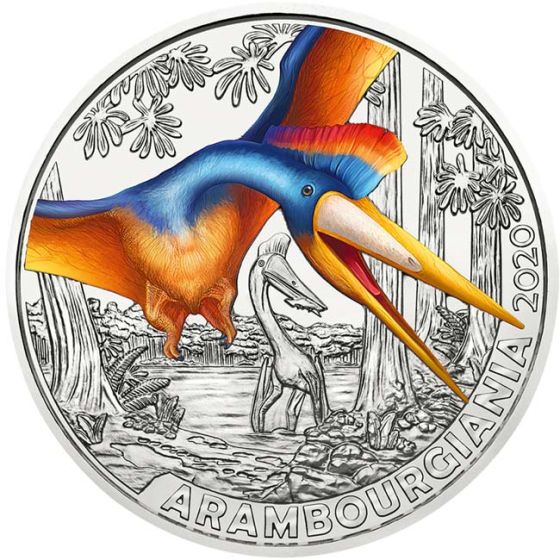Delivery date: Immediate
SKU
01520006
2020 Austria Copper-Nickel 2020 Austria Copper-Nickel Arambourgiania Philadelphiae PN PN
Tax:
0%
* excl. shipping
Annotation:
The images displayed are iconic photos.
This product is NOT subject to the right of withdrawal.
| SKU | 01520006 |
|---|---|
| Description | 4 – loose |
| Condition | Newly minted |
| Face Value | EUR 3 |
| Country | Austria |
| Weight (g) | 20.000000 |
| Fine Weight (g) | 0.000000 |
| Material | Copper-Nickel |
| Diameter (mm) | 34 |
| Condition | PN |
| Mintage | 65000 |
| Issue Date | 10.06.2020 |
| Delivery date | Immediate |
Behold the bright and colorful series from the Austrian Mint - Supersaurs! This series brings prehistoric giants back to life in the shape of 12 superb glow-in-the-dark coins.
Coin Highlights:
Cupro-Nickel composition.
Individual coins are packaged in protective packaging.
Mintage of 50,000 coins.
Obverse: Displays a collage of the 12 dinosaurs to be recognized in the series along with the unique €3 denomination.
Reverse: Features a color-printed Arambourgiania featuring glow-in-the-dark technology.
Guaranteed by the Austrian Mint.
Protect your Colorful Supersaurs coin by adding this capsule to your order.
Add this 2020 Austria Cupro-Nickel €3 Colorful Supersaurs Arambourgiania coin to your cart today!
The prehistoric behemoth that features on the third coin in the Supersaurs series is the largest flying animal to have ever dominated the skies - Arambourgiania. With a beak like a pelican, a neck like a giraffe, wings like a giant bat and a crest like a Mohican haircut, this extraordinary pterosaur is brought colorfully back to life on this superb coin. Widespread short-tailed flying reptiles that died out at the end of the Cretaceous period some 66 million years ago, Arambourgiania were enormous creatures. Researchers estimate that the largest species had a 3-meter-long neck, a 13-meter wingspan and stood 5 meters tall. The earliest vertebrates known to have evolved powered flight, pterosaurs are often referred to as "flying dinosaurs". While that is not the case, they were more closely related to dinosaurs than to contemporary reptiles such as the crocodile.

